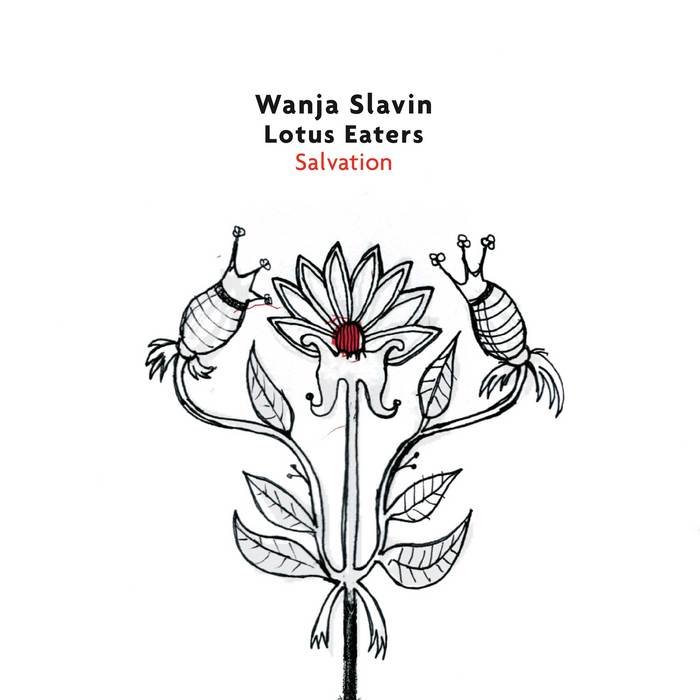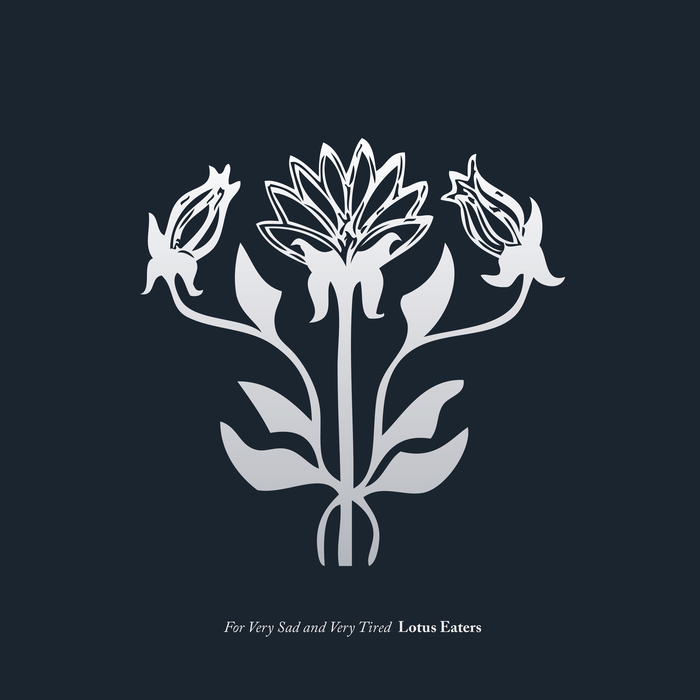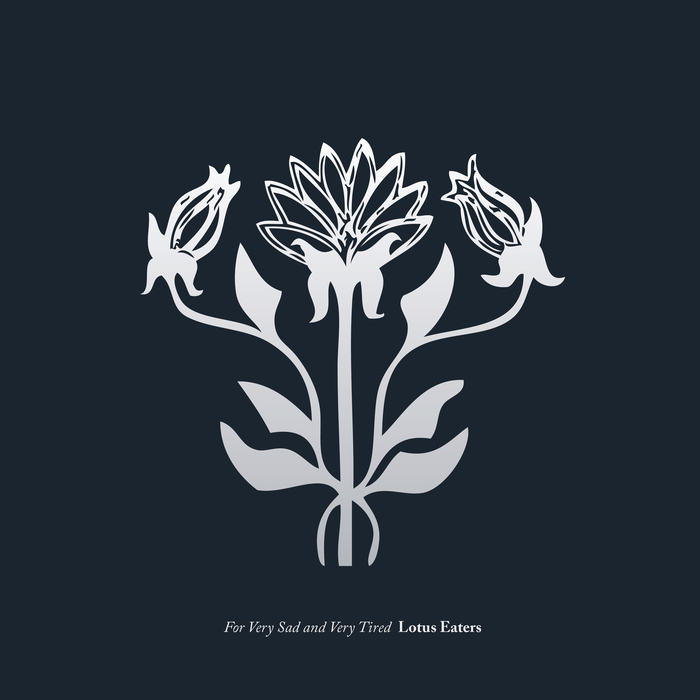It’s a given that he’s one of the best alto saxophonists in Germany – or anywhere else, for that matter. His play has earned him the commensurate awards – important waystations along Wanja Slavin’s musical journey rather than any sort of existential musical goal. His extraordinary talent as improviser and interpreter is simply the prerequisite for everything that follows.
Wanja Slavin is a bandleader who wants more – and it resonates in the way he works with his Lotus Eaters. It’s why he so scrupulously fine-tunes his arrangements, it’s the reason that time and again he alters his band personnel in order to encompass the overriding musical ideas more conclusively. With such a background, he sees himself as a part of an organic whole rather than the lead soloist.
On Salvation, a musician known for his free play in diverse Avant-garde constellations commits to the melodics of song form. Wanja Slavin considers The Lotus Eaters to be his most important band.
Wanja isn’t one to hide behind his music. In this postmodern period, he has to deal with everything that’s out there. With the Lotus Eaters, he has come a long way in the art of defining and refining the essential. He doesn’t copy and he stays clear of irony. He has no need of these crutches, since he’s not afraid of standing on his own two feet.
He’s someone who reveals himself, someone who knows that today, listening to music, as well as playing it, can only happen within the framework in mind. For Wanja it’s a question of placing particles and elements into other contexts. With him, these rearrangements are not concerned with the swagger of competition or creating clever collages. Here they evolve towards something larger.
Releases
For Very Sad and Very Tired Lotus Eaters
Wanja Slavin Lotus Eaters
2014 WhyPlayJazz (RS012LP)
For Very Sad and Very Tired Lotus Eaters
Wanja Slavin Lotus Eaters
2014 WhyPlayJazz (RS012)
Concerts
Sie sind Veranstalter und möchten Wanja Slavin Lotus Eaters für ein Konzert oder Festival buchen? Verfügbarkeit: auf Anfrage.
Audio/Photos/Videos
Reviews
The seven tracks on "Salvation" are the impressive calling card of an instrumentalist and composer who has been profoundly heard for several years now and whose work has been awarded with several prizes. [...] It is a jazz that trusts in melodies and emotions, lives out sound images, crystallizes interplays, and integrates eclectic influences so elegantly that never the feeling of construction or diligent work comes up. [...] "Salvation" is far from pushing into the foreground with fashionably well-written vocabulary. Here, a breath of music that is based on the Songhaft and with their moods and exciting interactions makes the contemporary Jazzuniversum richer.
Kontemplativ bis spirituell ist die Grundstimmung, manches davon hat keine Angst vor Fusion, das Heil dieser „Salvation“ liegt keinesfalls im Purismus. Trotzdem hat „Salvation“ eine wunderbar geschlossene Stimmung, setzt hier und da energischere Akzente, verliert aber nie seine stabil gesetzten Bögen aus dem Blick, die scheinbar wenig benötigen, um zu halten.
The saxophonist creates here on the basis of calm modern jazz a sleepy and at the same time bright-awake mood, which mixes up with one or the other misunderstanding, so that it does not get too well-feeling; he creates a midnight dreamland of sounds in which one wants to disappear, with which one wants to be one, dissolving the boundary between inside and outside.
For years Wanja Slavin was regarded as a saxophone miracle, but also as a saxophone phantom - sometimes he was there, sometimes not. Since 2014, the alto saxophonist seems to be permanently present [...]. He keeps on remaking, he is not satisfied for a long time. Even the best recording is not valid for him, as long as the feeling is not right. Slavin's feeling wants a medium tempo, a gentle, abstract brass section, a brooding, gradually increasing dynamic, ecstatic increases, collective improvisations, liberating solos. With this mature work Slavin overtakes his own phantom. [...] It is a new beginning, a very big one.
Easy flowing orchestral soundscapes, multi-dimensional tonal textures and a fine balance between acoustic and electric vibes.
[...] die Musik der Lotus Eaters trübt keinerlei Zeitkolorit. Sie schwebt auf der Suche nach ihren eigenen Glücksmomenten über Stile und Zeiten hinweg wie eine majestätische, vielleicht manchmal leicht ins regengrau spielende Cumuluswolke.
Wanja Slavin Lotus Eaters would appear to be less a fixed entity than a malleable unit the leader adjusts to suit the material in play. To that end, the seven pieces comprising Salvation, the alto saxophonist's second Lotus Eaters album, were laid down in three recording sessions using alternating lineups, an acoustic jazz ensemble thus appearing on some tunes and an electrified outfit on others. [...] Salvation is distinguished by the quality of its compositions and performances, and at forty minutes states its case with commendable concision.
The presence of this music is large—huge, even, at times—but the intricacies that guide the ear through each of the seven pieces of Salvation give the music the kind of rich details that make a short story seem like an epic journey. This isn’t an album that seeks to dazzle the listener with vivid imagery; it’s a ceaseless stream that provides one thrill after the other, and a different emotional reaction for each change in tone and tempo and harmonic embrace. This is one of the gems, thus far, of 2018 [...].
"When I've written a piece I like, I always have a pretty good idea of what vibe I want. If we do not get that (un)certain feeling, I can not or do not want to put that on a record. This is probably the reason why this record took me so long" This explains why it has been relatively less records from an omnipresent alto saxophonist and composer. So far there are only a few shots. Therefore, one should consider and preserve the existing as a gem!
[...] a CD that I could not stop listening to [...].
As a rule, a band is a defined group of musicians who implement one or more projects in a particular constellation. This is not the case with Wanja Slavin's Lotus Eaters, who are competing in three different formations on their new CD "Salvation". Surprisingly, the saxophonist from Berlin manages to weave a very stringent acoustic novel out of this squad puzzle [...]. He is an impressionist who loves when all the elements flow into each other. Harmonies and melodies are as important to him as a homogeneous tone color image. [...] "I am looking for musicians like Philipp Gropper, with whom I can implement such ideas, but I am still far from having the search." Thus, "Salvation" is ultimately the atmospheric documentation of a successful search.
However effortlessly [Wanja Slavin in the band "Amok Amor"] could follow the intricate instrumental art of his colleagues, so much did Slavin's own qualities as a wonderful melodicist and expressive composer were lost in the much admired project. Now he convinces with the second CD production of his "Lotus Eaters" all along the line. "Salvation" [...] captivates with a group sound, which emphasizes the common soundscape in three moderately varied sextet settings instead of setting up launcher for soloistic splendor. The pieces develop into subtle layers. Individual voices push each other forward. Sensitive, lively syncopated rhythms give the whole thing a good drive, casually developing a gentle retro sound.
We would like to listen to the musicians, who make up the wealth of the Berlin scene, on the French stages. [...] Wanja Slavin, alto saxophonist, composer and leader of Lotus Eaters, deserves an invitation! As in the previous album, he proves his attachment to the great history of modern jazz, which is reflected in his compositions. However, he knows how to add his own note (a special way of dealing with harmonies, the integration of electronic instruments, a certain poetry ...) [...] A musician who should not lose sight of and an album that does deserves to appear on the shopping list!
[...] the alto saxophonist, born in Freiburg in 1982, who is capable of expressive ecstasy, for instance in interaction with the high-energy drummer Christian Lillinger, is a scrupulously puritanical perfectionist in his own projects [...]. The title is program, the salvation of every listener certainly.
Wanja Slavin Lotus Eaters is a sextet with a beautiful timbre. The group plays contemporary compositions with an excellent balance between melody, atmosphere and improvisation. [...] The compositions are modern in structure, but sound harmonious in combination with polyrhythms, exciting themes and intense solo work. [...] With the CD 'Salvation', the Lotus Eaters would be a big win for the upcoming festival season.
In each of the seven pieces, the three variants of the Wanja Slavin Lotus Eaters break the respective conventions.
From the very first notes of the album it is immediately apparent that this is a modern Jazz masterpiece in every respect. The melody based compositions are dressed up in contemporary arrangements, which include unusual rhythmic patterns and harmonic structures, creating a unique kaleidoscope of superb music, which is fascinating from start to finish and does not cease to explore uncharted territory and create new aural vistas. The level of these compositions is completely breathtaking and has very little competition elsewhere within music belonging to the same Jazz dialect. The ability to create an amalgam of the Jazz tradition, Classical influences and up to date approach, which incorporates elements form electronic music and above all allows a generous amount of space and freedom for improvisation is overall extremely effective. [...]
This album is a brilliant example of what European Jazz is all about; it is evident in its highly aesthetic values, its elegance and subtlety, its refinement and sophistication, which is simply unmatched anywhere else on this planet. The young Jazz Artists from Berlin, Warsaw, Copenhagen and Oslo manage to take the Jazz idiom to the next level, leaving the old world tarried far behind. If this album is an indication as to what can be expected in 2018, life is definitely worth living and there is no better way to kickoff another year of sublime music!
A penchant for perfection can be found in the compositions and arrangements of Slavin. It is not about wild, raw jazz, but about carefully constructed musical structures in which each note is important and fits in, but in which also is room for improvisation. [...] Wanja Slavin Lotus Eaters offer disciplined, ingenious and soulful jazz.
Each note plays a big role in the process, just like each chord fills us with its richness and resonance. [...] This is what I call intelligent jazz. Without assuming a spotlight-craving role, Slavin assures a responsive treatment to his compositions and still makes everyone shine. Salvation got me hooked on its contemporary charm.
Although he is associated primarily with the avant-garde scene, for "Salvation" presents Slavin melodious compositions with rich, sophisticated arrangements. [...] Very good, original album.
Mit gleich drei Besetzungen arbeitet der Berliner Altsaxofonist Wanja Slavin auf dem neuen Album seiner 2012 formierten Band "Lotus Eaters", mit der er zum zweiten Mal nach dem 2014 erschienenen "For Very Sad and Very Tired Lotus Eaters" aufnimmt. Solch kompromissloser Formwille, der nicht den Kontingenzen der Terminverfügbarkeit geschuldet ist, sondern sich Slavins spielästhetischer Akkuratesse verdankt, nimmt einen sofort für sich ein.
The individual statements by the quartet members are all splendid. Slavin's alto saxophone has a mellow, enchanting tone, which caresses the listener's ears gently. Bohm does a wonderful job supporting the leader and although plays little foreground solos, his background layers are as much important. Lang is as usual simply outstanding and step by step becomes one of my favorite bassist of the young European scene. Backhaus is a bit too busy for my taste and not completely compatible with the album's concept, but perhaps his activity provides a contrast which has a positive influence on the overall sonic result.
This kind of music should be accessible to a wide range of Jazz listeners, as there is so much to like herein, that everybody can hand on to something else that strikes a chord; some will like the tunes, others the splendid performances and yet others might be delighted by the degree of freedom and space present, in spite of the seemingly "simple" approach. Regardless of the specific viewpoint, it is very hard not to like this album from the first hearing. Well done!
[...] ist der Auftritt der Lotus Eaters voller von Slavin wunderbar geführter melodischer Trouvaillen. Rainer Böhm steht Slavin im Körpereinsatz nichts nach, er beschwört sein Klavier. Die Freude am gemeinsamen Musizieren ist den Musikern, besonders Bassist Andreas Lang, anzusehen, es ist eine Freude zuzuhören, auch wenn Slavin selbst bisweilen nicht sehr zufrieden scheint.
Das Titelstück, eine durch Johnny Hodges bekannt gewordene Strayhorn-Ballade, bringt die Stimmung der CD auf den Begriff: Melodiosität und Melancholie vermitteln Einsamkeit, Wehmut und Weltschmerz. Der weiche Klang des Altos, der manchmal an Klarinette und Querflöte erinnert, dringt ins Herz.
Referenzen in die Geschichte der improvisierten Musik, aber auch hinein in die heutige Szene des Modern Jazz, um das musikalisch Besondere im Konventionellen herauszuarbeiten: Dem Berliner Saxofonisten Wanja Slavin ist dieses Kunststück mit seiner neuen CD „For Very Sad And Very Tired Lotus Eaters“ (WhyPlayJazz/whyplayjazz.de) geglückt. Nach seiner langen Suche, um die richtige Besetzung für sein jetzt geradezu klassisch besetztes Quartett Lotus Eaters zu finden, und dem Experimentieren mit verschiedenen musikalischen Settings hat der Anfang 30-Jährige mit der zweiten CD seiner Band ein Konzept gefunden, mit dem er die emotionale Ebene mit der intellektuellen verschränkt, ohne Konzessionen eingehen zu müssen. „Es gibt kein kompositorisches Konzept für das Album“, betont Slavin, „mir ist es darum gegangen, mit dem musikalischen Material, auf dem jedes meiner Stücke basiert, eine bestimmte Stimmung zu transportieren.“ Mit Ausnahme des Titelstücks, einer Ballade des Ellington-Komponisten Billy Strayhorn, die Slavins Quartett auch den Namen gegeben hat, beziehen sich alle Kompositionen auf Aufnahmen namhafter Jazzmusiker — wie Slavins „Hippie Song“, der auf dem „Back Woods Song“ des Gateway-Tios von John Abercrombie, Dave Holland und Jack DeJohnette flußt. Doch Slavin interpretiert diesen Titel nicht. Vielmehr hat der Saxofonist sein Gefühl beim ersten Hören kompositorisch verarbeitet und dieses dann mit seinem Quartett in ein eigenes Stück Jazzmusik verwandelt. „Musik ist voller Referenzen — jedenfalls in meinem Kopf: Alles bezieht sich immer auf irgendetwas, das schon einmal da gewesen ist“, erklärt Slavin: „Die Musik meiner CD zeigt die Tradition, in der ich stehe.“
It’s a stunning conclusion, so full of depth and enchantment, to an album that rewards repeated listenings.
Bedacht, ja skrupulös geht der in Berlin lebende Altsaxofonist Wanja Slavin an seine raren Veröffentlichungen heran. Auch mit dieser CD seiner vielfach gewandelten Band Lotus Eaters hat er lange auf den richtigen Zeitpunkt gewartet. Was man nun in sechs Quartettstücken, einmal um Saxophonkollegen Philipp Gropper ergänzt, hören kann, ist sehr ausgewogene Musik, die bei aller Disziplin nicht vergisst, dass Jazz von der Spontanität lebt. In seinen Kompositionen hat sich Slavln an den Vorbildern John Abercrombie, Yuaef Lateef, Kurt Rosenwinkel, Charles Lloyd und Hermeto Pascoal orientiert, und das Schwelgerische der Ergebnisse widerspiegelt das Innige dieser Zuneigungen. Da ist viel Melancholie und noch mehr zupackender Furor.
Urplötzlich drehten Wanja Slavin und seine Mitstreiter auf: Deep Jazz in verstörender Vollendung. Zu hören war eine musikalische Avantgarde der besonderen Art. [...] Jeder Impuls, jeder erdenkliche inspirierende Einfluss wurde aufgesogen und in musikalische Energie umgesetzt. Da waren Künstler am Werk, die ihre Musik ernst nehmen und sie geradezu zelebrieren auf dem Hochaltar der Jazzkultur, authentisch und wahrhaftig.
Auch die Kompositionen, die er (Wanja Slavin) den Juroren und über sechshundert weiteren Zuhörern bot, zeigten ähnliche Stärken wie sein Spiel. Er lässt sich keine Berührungsängste vor den zeitlosen Werten des Jazz anmerken, bemüht sich aber beim Zitieren von bestimmten lyrischen Stimmungsbildern und Klangfarben-Kombinationen um frische melodisch-harmonische Deutungen.



